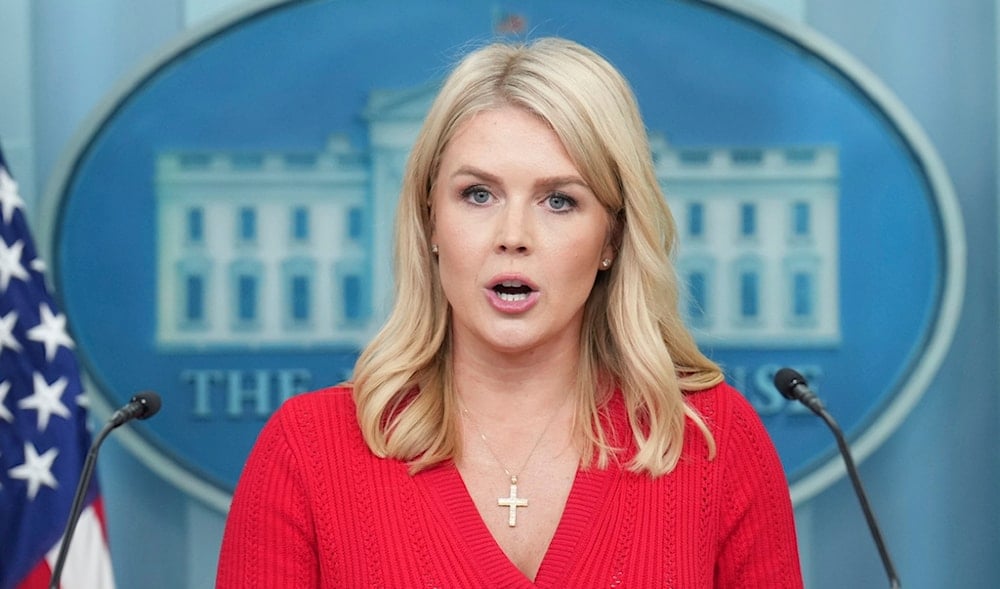White House reportedly pauses new US sanctions on Iran amid talks: WSJ
A White House directive has reportedly paused new US sanctions on Iran, raising questions about the future of the “maximum pressure” strategy as indirect talks between Tehran and Washington continue.
-

White House press secretary Karoline Leavitt speaks with reporters in the James Brady Press Briefing Room at the White House, Thursday, May 29, 2025, in Washington. (AP)
A new report by The Wall Street Journal claims that the White House has paused the introduction of new US sanctions on Iran, despite ongoing indirect negotiations and continued implementation of the so-called "maximum pressure" strategy.
According to the Sunday report, a directive was issued by White House Press Secretary Karoline Leavitt, instructing agencies to suspend all new sanctions activity targeting the Islamic Republic. The directive, which reportedly reached officials at the National Security Council (NSC), the Treasury Department, and the State Department, raised concerns due to its unusual source, coming from the press secretary rather than the NSC or Treasury.
Trump’s 'maximum pressure' strategy in question
The move has prompted internal questions about the future of the Trump-era strategy aimed at weakening Iran’s economy. The maximum pressure campaign, initiated under President Donald Trump during his first term, has included Washington’s withdrawal from the 2015 nuclear deal and the reimposition and expansion of unilateral economic sanctions.
Despite President Trump's renewed tenure and a more aggressive enforcement posture, recent developments suggest potential recalibration. Trump has demanded that Iran reduce uranium enrichment to "zero" and has even threatened military action against the Islamic Republic’s nuclear facilities.
Internal disarray and policy uncertainty in Washington
The Journal report suggests the pause may reflect broader dysfunction within US foreign policy circles. It cites sources close to the White House saying that over 100 NSC staff members are on leave, while policy responsibilities remain fragmented between the State Department and the Office of the Vice President.
While the White House has not confirmed a formal halt in sanctions activity, Deputy Press Secretary Anna Kelly stated that future sanctions decisions would be announced by the appropriate agencies.
Since May 21, no new designations have been made, and at least two planned Treasury sanctions have reportedly been delayed.
Within Washington, the move has sparked differing interpretations. Some officials see it as a short-term review mechanism, while others express concern that it marks a retreat from the “maximum pressure” posture.
Nonetheless, Iranian President Masoud Pezeshkian recently declared that Iran remains “more powerful than ever”, reaffirming Tehran’s resolve in the face of continued sanctions.
Iran holds firm on nuclear enrichment
Simultaneously, Iran has reaffirmed its commitment to uranium enrichment, insisting that it is a non-negotiable right under the Nuclear Non-Proliferation Treaty (NPT). The head of Iran’s nuclear agency emphasized that the country’s peaceful nuclear program will continue regardless of American pressure.
Iranian Foreign Ministry spokesperson Esmaeil Baghaei echoed this stance in a weekly press briefing, calling instead for international pressure to focus on dismantling "Israel's" unmonitored nuclear arsenal, highlighting Washington’s selective enforcement of nuclear accountability in the region.
Despite the ongoing tensions, indirect US-Iran talks, mediated by Oman, have continued since April. Observers say the reported sanctions pause may be a tactical move tied to the sensitive nature of these discussions, though others warn it may reflect confusion or exclusion of key officials from critical decisions.
There is also ambiguity surrounding the scope of the pause, whether it covers only new sanctions or also limits the enforcement of existing measures.
Latest update
In its latest update, Iran’s top nuclear negotiator, Foreign Minister Abbas Araghchi, announced that Tehran is preparing a formal response to a recent proposal presented by US negotiator Steve Witkoff.
Speaking at a cabinet session on Sunday evening, Araghchi confirmed that the proposal had been delivered via Omani Foreign Minister Badr Al Busaidi, who made a brief visit to Tehran.
In a statement posted on X the previous day, Araghchi said Iran would respond to the offer "based on principles, national interests, and the rights of the Iranian people to the proposal."
My dear brother @badralbusaidi, distinguished Foreign Minister of Oman, paid a short visit to Tehran today to present elements of a US proposal which will be appropriately responded to in line with the principles, national interests and rights of the people of Iran. pic.twitter.com/3XyewmFJhD
— Seyed Abbas Araghchi (@araghchi) May 31, 2025

 4 Min Read
4 Min Read










